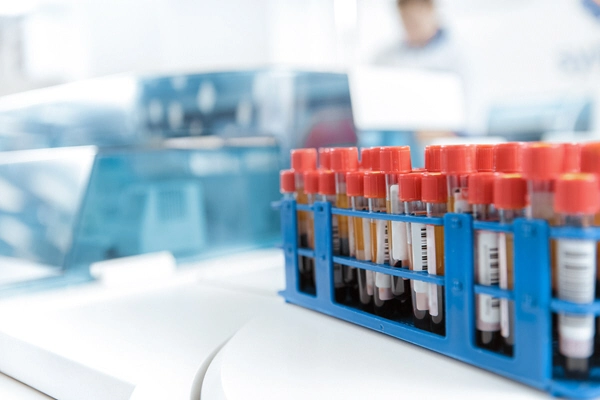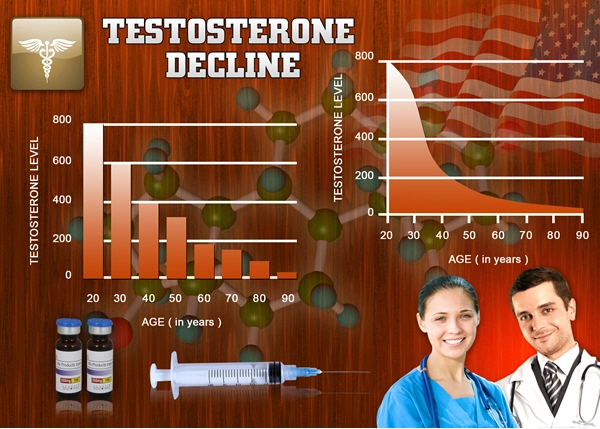
The Role of Testosterone in Male Sexual Health
Testosterone is often heralded as the key hormone driving male sexuality, virility, and overall health. It plays a crucial role in developing male sexual characteristics, such as muscle strength, hair growth, and a deeper voice. Most importantly, testosterone is vital for maintaining sexual libido, sperm production, and erectile function. Normal levels of testosterone promote the dilation of blood vessels, enhancing blood flow to the penis, which is crucial for achieving and maintaining an erection.
However, testosterone levels naturally begin to decline with age, typically starting around the age of 30. This gradual decrease can lead to changes in sexual function, mood, and overall energy levels. Symptoms of low testosterone (Low T) include reduced sexual desire, difficulty in achieving erections, low sperm count, and increased body fat.
Estrogen's Influence on Male Physiology
While estrogen is predominantly considered a female hormone, it also plays a significant role in male health. Men produce estrogen through a process involving an enzyme called aromatase which converts testosterone into estrogen. Estrogen helps regulate libido, erectile function, and the production of sperm in men. It is essential for maintaining the right balance between testosterone and estrogen levels to ensure optimal sexual health and function.
Excessive levels of estrogen in men, however, can lead to several issues including weight gain, increased body fat, loss of muscle mass, and problems with achieving and maintaining an erection. High levels of estrogen can also suppress the production of testosterone, further exacerbating sexual health problems.
Soft Erections and Hormonal Imbalance
Soft erections, or erectile dysfunction (ED), can often be a symptom of hormonal imbalance in men. While many factors can contribute to ED, hormonal issues such as low testosterone and high estrogen levels are significant contributors. Testosterone is essential for the nerve impulses that initiate blood flow to the penis, which is crucial for achieving an erection. When testosterone levels are low, these impulses weaken, leading to difficulties in maintaining an erection.
Furthermore, high levels of estrogen can lead to an increase in body fat and can affect the brain areas responsible for sexual desire and arousal. The imbalance between testosterone and estrogen not only impacts the ability to achieve an erection but can also reduce sexual desire, which can compound the problem of ED.
Managing Hormonal Imbalance
For men experiencing soft erections and suspect a hormonal imbalance, it is advisable to consult a healthcare provider. A thorough evaluation, including a detailed medical history, physical examination, and blood tests to measure hormone levels, can help diagnose the issue. Treatment options vary depending on the underlying cause but may include:
- **Testosterone Replacement Therapy (TRT):** This is often prescribed for men with significantly low levels of testosterone. TRT can help restore libido, improve erectile function, and increase muscle mass and strength. However, TRT needs to be carefully managed due to potential side effects, including an increased risk of heart disease and prostate health issues.
- **Estrogen Blockers:** For men with high levels of estrogen, medications that act as estrogen blockers can be used. These drugs help reduce the overall levels of estrogen and improve the balance between testosterone and estrogen.
- **Lifestyle Changes:** In many cases, adjusting lifestyle factors such as diet, exercise, and stress management can significantly impact hormone levels. Reducing body fat, particularly abdominal fat, can help decrease estrogen levels and increase testosterone production.
Conclusion
The interplay between testosterone, estrogen, and erectile function is complex but crucial for maintaining sexual health in men. Understanding and managing these hormonal balances can help mitigate issues such as soft erections and contribute to overall well-being. Men experiencing symptoms of hormonal imbalance should seek professional medical advice to appropriately address these concerns and restore their quality of life.

- A Comprehensive Guide to Understanding Erectile Rigidity: The Labyrinth of Soft Erections [Last Updated On: February 25th, 2025] [Originally Added On: February 25th, 2025]
- The Gradual Decline: Unraveling the Science of Softening Erections [Last Updated On: February 26th, 2025] [Originally Added On: February 26th, 2025]
- Revolutionizing Gender Stereotypes: Mastering Confidence Amidst Soft Erections [Last Updated On: February 27th, 2025] [Originally Added On: February 27th, 2025]
- Reviving Manhood: The Power of Lifestyle Alterations in Enhancing Erectile Potency [Last Updated On: February 28th, 2025] [Originally Added On: February 28th, 2025]
- Unfolding Silent Battles: Personal Narratives of Men Confronting Erectile Dysfunction [Last Updated On: February 28th, 2025] [Originally Added On: February 28th, 2025]
- The Power of the Psyche: A Deep Dive Into the Effects of Psychological Stress on Male Sexual Health [Last Updated On: March 1st, 2025] [Originally Added On: March 1st, 2025]
- Demystifying the Stigma: An Objective Discourse on Erectile Dysfunction [Last Updated On: March 2nd, 2025] [Originally Added On: March 2nd, 2025]
- Enhancing Erectile Function Through Exercise: Understanding the Benefits of Physical Activity for Combating Erectile Dysfunction [Last Updated On: March 3rd, 2025] [Originally Added On: March 3rd, 2025]
- Nutritional Strategies to Enhance Erectile Function and Health [Last Updated On: March 4th, 2025] [Originally Added On: March 4th, 2025]
- From Flab to Firm: The Role of Weight Loss in Enhancing Male Sexual Health [Last Updated On: March 5th, 2025] [Originally Added On: March 5th, 2025]
- Exploring Sleep's Impact on Erectile Function and Male Sexual Health [Last Updated On: March 5th, 2025] [Originally Added On: March 5th, 2025]
- Enhancing Erection Quality: The Role of Meditation and Mindfulness in American Males [Last Updated On: March 5th, 2025] [Originally Added On: March 5th, 2025]
- Understanding and Managing Soft Erections: Causes, Strategies, and Treatments [Last Updated On: March 6th, 2025] [Originally Added On: March 6th, 2025]
- The Crucial Link Between Blood Flow and Erectile Function: Vascular Insights for Men [Last Updated On: March 8th, 2025] [Originally Added On: March 8th, 2025]
- The Interconnection of Health and Erectile Dysfunction: A Holistic Wellness Approach for Men [Last Updated On: March 9th, 2025] [Originally Added On: March 9th, 2025]
- Aging and Soft Erections: Causes, Management, and Support for American Males [Last Updated On: March 10th, 2025] [Originally Added On: March 10th, 2025]
- Debunking Myths: The Truth About Soft Erections in American Men [Last Updated On: March 14th, 2025] [Originally Added On: March 12th, 2025]
- Navigating the Challenges of Drug-Induced Erectile Dysfunction in American Males [Last Updated On: March 13th, 2025] [Originally Added On: March 13th, 2025]
- Mastering Stress: Strategies to Overcome Stress-Induced Erectile Challenges in American Men [Last Updated On: March 15th, 2025] [Originally Added On: March 15th, 2025]
- Understanding Soft Erections: Causes, Impacts, and Treatment Options for American Males [Last Updated On: March 17th, 2025] [Originally Added On: March 17th, 2025]
- Counseling's Role in Managing Soft Erections: A Holistic Approach [Last Updated On: March 17th, 2025] [Originally Added On: March 17th, 2025]
- Vitamins and Minerals: Enhancing Erection Quality and Sexual Health [Last Updated On: March 17th, 2025] [Originally Added On: March 17th, 2025]
- Herbal Remedies for Enhancing Erectile Function in American Males [Last Updated On: March 18th, 2025] [Originally Added On: March 18th, 2025]
- Smoking's Impact on Erectile Dysfunction: Benefits of Quitting for American Men [Last Updated On: March 19th, 2025] [Originally Added On: March 19th, 2025]
- Enhancing Erection Health: Diet, Exercise, Stress Management, and Holistic Wellness Strategies [Last Updated On: March 20th, 2025] [Originally Added On: March 20th, 2025]
- Soft Erections in Young Men: Causes and Effective Solutions Explored [Last Updated On: March 20th, 2025] [Originally Added On: March 20th, 2025]
- Diagnosing Soft Erections: A Comprehensive Guide to Understanding and Managing ED [Last Updated On: March 20th, 2025] [Originally Added On: March 20th, 2025]
- Alcohol's Impact on Erection Quality: Strategies for American Males [Last Updated On: March 21st, 2025] [Originally Added On: March 21st, 2025]
- American Couples Overcoming Soft Erections: Communication, Therapy, and Lifestyle Changes [Last Updated On: March 22nd, 2025] [Originally Added On: March 22nd, 2025]
- Soft Erections and Mental Health: Understanding and Addressing the Connection [Last Updated On: March 22nd, 2025] [Originally Added On: March 22nd, 2025]
- Genetic Factors in Erectile Dysfunction: Insights and Implications for American Males [Last Updated On: March 22nd, 2025] [Originally Added On: March 22nd, 2025]
- Nitric Oxide's Role in Male Erections: Combating Soft Erections in American Men [Last Updated On: March 22nd, 2025] [Originally Added On: March 22nd, 2025]
- Workplace Stress and Its Impact on American Men's Sexual Health and ED [Last Updated On: March 22nd, 2025] [Originally Added On: March 22nd, 2025]
- Behavioral Strategies to Overcome Soft Erections in American Men [Last Updated On: March 22nd, 2025] [Originally Added On: March 22nd, 2025]
- Cardiovascular Health's Impact on Erection Quality: A Comprehensive Guide [Last Updated On: March 22nd, 2025] [Originally Added On: March 22nd, 2025]
- Biofeedback: Enhancing Erectile Control and Addressing Soft Erections in Men [Last Updated On: March 22nd, 2025] [Originally Added On: March 22nd, 2025]
- Exploring Alternative Medicine for Enhancing Erectile Health in American Men [Last Updated On: March 23rd, 2025] [Originally Added On: March 23rd, 2025]
- Pelvic Floor Exercises: Enhancing Erection Quality and Sexual Health in Men [Last Updated On: March 23rd, 2025] [Originally Added On: March 23rd, 2025]
- Embracing Vulnerability: Redefining Sexual Success with Soft Erections [Last Updated On: March 23rd, 2025] [Originally Added On: March 23rd, 2025]
- Physical Therapy: A Promising Non-Invasive Treatment for Soft Erections [Last Updated On: March 24th, 2025] [Originally Added On: March 24th, 2025]
- Economic Impact of Soft Erections on American Men: Costs and Solutions [Last Updated On: March 24th, 2025] [Originally Added On: March 24th, 2025]
- Soft Erections vs. Erectile Dysfunction: Understanding and Treatment for American Males [Last Updated On: March 24th, 2025] [Originally Added On: March 24th, 2025]
- Soft Erections: Understanding, Communicating, and Overcoming ED in Relationships [Last Updated On: March 24th, 2025] [Originally Added On: March 24th, 2025]
- Exploring Alternative Therapies for Soft Erections: A Comprehensive Guide [Last Updated On: March 24th, 2025] [Originally Added On: March 24th, 2025]
- Innovative Technologies Revolutionizing Erectile Dysfunction Treatment [Last Updated On: March 24th, 2025] [Originally Added On: March 24th, 2025]
- Understanding Soft Erections: Causes, Diagnosis, and Treatment Options for American Men [Last Updated On: March 24th, 2025] [Originally Added On: March 24th, 2025]
- Managing Soft Erections: Understanding, Preparing, and Treating ED Effectively [Last Updated On: March 24th, 2025] [Originally Added On: March 24th, 2025]
- Obesity and Soft Erections: The Crucial Role of Weight Management in Sexual Health [Last Updated On: March 24th, 2025] [Originally Added On: March 24th, 2025]
- Managing Soft Erections: Beyond Standard PDE5 Inhibitors [Last Updated On: March 25th, 2025] [Originally Added On: March 25th, 2025]
- Metabolic Syndrome and Soft Erections: Understanding the Link in American Males [Last Updated On: March 25th, 2025] [Originally Added On: March 25th, 2025]
- Environmental Toxins: A Hidden Threat to Male Sexual Health and Erections [Last Updated On: March 25th, 2025] [Originally Added On: March 25th, 2025]
- Mindfulness Techniques to Manage and Overcome Soft Erections: A Step-by-Step Guide [Last Updated On: March 25th, 2025] [Originally Added On: March 25th, 2025]
- Soft Erections and Self-Esteem: Psychological Strategies for Recovery and Confidence [Last Updated On: March 25th, 2025] [Originally Added On: March 25th, 2025]
- Hormonal Health and Erections: Optimizing Endocrine Function for Better Sexual Outcomes [Last Updated On: March 26th, 2025] [Originally Added On: March 26th, 2025]
- Superfoods Boost Vascular Health, Combat Soft Erections in American Men [Last Updated On: March 26th, 2025] [Originally Added On: March 26th, 2025]
- Soft Erections and Prostate Health: A Vital Connection for American Men [Last Updated On: March 27th, 2025] [Originally Added On: March 27th, 2025]
- Overcoming Soft Erections: Medical, Lifestyle, and Psychological Solutions for American Men [Last Updated On: March 27th, 2025] [Originally Added On: March 27th, 2025]
- Enhancing Sexual Stamina and Managing Soft Erections: A Comprehensive Guide [Last Updated On: March 27th, 2025] [Originally Added On: March 27th, 2025]
- Sleep Disorders Impact on Erections: Insights and Management for American Men [Last Updated On: March 27th, 2025] [Originally Added On: March 27th, 2025]
- Sedentary Lifestyles and Erection Health: Impact and Exercise Solutions for American Males [Last Updated On: March 27th, 2025] [Originally Added On: March 27th, 2025]
- Digital Health Innovations for Monitoring and Managing Soft Erections in Men [Last Updated On: March 27th, 2025] [Originally Added On: March 27th, 2025]
- Understanding and Treating Soft Erections: A Comprehensive Guide for American Men [Last Updated On: March 27th, 2025] [Originally Added On: March 27th, 2025]
- Understanding and Overcoming Soft Erections: A Comprehensive Guide for American Males [Last Updated On: March 27th, 2025] [Originally Added On: March 27th, 2025]
- Chronic Inflammation and Soft Erections: Impacts on Male Sexual Health [Last Updated On: March 27th, 2025] [Originally Added On: March 27th, 2025]
- Erection Physiology: Understanding and Addressing Soft Erections in American Males [Last Updated On: March 28th, 2025] [Originally Added On: March 28th, 2025]
- Vacuum Pumps and Innovative Devices: Enhancing Erection Quality and Sexual Health [Last Updated On: March 28th, 2025] [Originally Added On: March 28th, 2025]
- Medication-Induced ED: Causes, Mechanisms, and Management Strategies for American Males [Last Updated On: March 28th, 2025] [Originally Added On: March 28th, 2025]
- Cardiovascular Exercise Boosts Erection Quality in American Males [Last Updated On: March 29th, 2025] [Originally Added On: March 29th, 2025]
- Stress Management Techniques to Improve Men's Erectile Function: A Comprehensive Guide [Last Updated On: March 30th, 2025] [Originally Added On: March 30th, 2025]
- Understanding Soft Erections: Causes, Impacts, and Embracing New Masculinity [Last Updated On: March 30th, 2025] [Originally Added On: March 30th, 2025]
- Nerve Health's Crucial Role in Enhancing Erectile Function for American Males [Last Updated On: March 30th, 2025] [Originally Added On: March 30th, 2025]
- Innovative Research and Technology Revolutionizing Soft Erection Treatments [Last Updated On: April 3rd, 2025] [Originally Added On: April 3rd, 2025]
- Soft Erections: Causes, Impacts, and Effective Management Strategies for American Men [Last Updated On: April 4th, 2025] [Originally Added On: April 4th, 2025]
- Lifestyle Changes to Enhance Erection Quality and Combat Erectile Dysfunction [Last Updated On: April 5th, 2025] [Originally Added On: April 5th, 2025]
- Navigating Soft Erections: Open Dialogue and Medical Insights for American Men [Last Updated On: April 7th, 2025] [Originally Added On: April 7th, 2025]
- Vascular Health's Crucial Role in Enhancing Erection Quality for American Men [Last Updated On: April 7th, 2025] [Originally Added On: April 7th, 2025]
- Cortisol's Impact on Erectile Function: Managing Stress for Better Sexual Health [Last Updated On: April 8th, 2025] [Originally Added On: April 8th, 2025]
- Soft Erections: Broader Impacts on American Men's Lives and Comprehensive Solutions [Last Updated On: April 8th, 2025] [Originally Added On: April 8th, 2025]
- Relationship Dynamics and Their Impact on Soft Erections in American Males [Last Updated On: April 10th, 2025] [Originally Added On: April 10th, 2025]
- Understanding Soft Erections: Causes, Impacts, and Holistic Management Strategies for American Men [Last Updated On: April 10th, 2025] [Originally Added On: April 10th, 2025]



List of USA state clinics - click a flag below for blood testing clinics.
Word Count: 620



















































